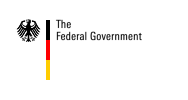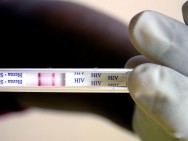"AIDS is a threat which can shake countries to the core, "according to the Chancellor. In many countries HIV/AIDS is still taboo. She wants to work to ensure that the topic is not marginalised.
Merkel was speaking to over 600 participants from more than 40 nations at the conference "Responsibility and Partnership – Together against HIV/AIDS". Under the umbrella of the German EU presidency, the Federal Ministry of Health is hosting this conference on 12 and 13 March in Bremen. The conference aims to lend new impetus to international cooperation in the fight against HIV/AIDS.
HIV is a global threat. Since it was first identified twenty-five years ago it has spread around the globe. In this time, the pandemic has cost about 30 million lives. Currently some 40 million people are living with HIV. In 2006 alone, their ranks were swelled by another 4.3 million HIV-positive individuals.
On the international agenda
Because of its global importance the Chancellor has put this topic on the agenda of the G8 summit. "We will make headway in Heiligendamm," Merkel promised.
Combating HIV/AIDS is also a priority of the German EU presidency, but action is by no means restricted to the EU ministers of health. Merkel announced that the results of the conference will also be a topic discussed at the meeting of heads of state and government in June.
The responsibility of society as a whole
"AIDS affects us all," said Merkel. In many countries, people living with HIV/AIDS have to cope with fears, prejudices, intolerance and rejection. Society as a whole must put an end to this.
Industry, the academic community and civil society are called on to take up their arms and fight HIV/AIDS. And cooperation must not stop at national boundaries.
In the Millennium Development Goals, the international community has expressly undertaken to work together to combat AIDS.
Merkel called on conference participants to make the most of the opportunities to establish networks. "Bremen can become synonymous with a new European HIV initiative," she said.
Involving civil society
Merkel praised in particular the work of non-governmental organisations. "NGO are strong, vital partners, and we could not do without them," she stated. They often toil away behind the scenes, performing extremely difficult work.
In many countries cultural factors make it difficult to speak openly about AIDS, since it is related to sexuality. This calls for a very personal approach and great sensitivity on the part of NGO staff members.
Merkel also thanked the many celebrities who have become involved in the campaign to combat AIDS. She made special mention of Her Highness the Begum Aga Khan, the actress Gudrun Landgrebe and the Werder Bremen football stars Miroslav Klose and Per Mertesacker.
The German government is taking action
On 7 March the Cabinet decided to step up the fight against the acquired immune deficiency syndrome. Funding was increased by one third to 400 million euros this year. The action plan adopted contains precise targets and lays out concrete steps that are to be realised by 2010. The focus of the action plan is on prevention.
Developing countries are particularly badly hit by AIDS. However, in the EU and its neighbours too the rate of new infections is rising strongly. In Eastern Europe and Central Asia it is estimated that last year alone 270,000 people became infected with HIV. That is a 70 % rise as compared to 2004.
>> World AIDS Report 2006
In Germany too, the number of new infections is rising. The main reason for this, according to Health Minister Ulla Schmidt, is a drop in risk awareness, particularly among young people.
Federal Minister of Health Ulla Schmidt, Federal Minister for Economic Cooperation and Development Heidemarie Wieczorek-Zeul and Federal Minister of Education and Research Annette Schavan are attending the conference. Their opposite numbers from Estonia, Luxembourg, Portugal, Russia, Sweden, Slovenia and the Ukraine have also made the trip to Bremen.A total of more than 40 nations are represented at the AIDS conference, with a great many experts in the field and NGOs among the participants.

